新概念英语第二册 Lesson 2 Breakfast or lunch? 课件 (共20张PPT)
文档属性
| 名称 | 新概念英语第二册 Lesson 2 Breakfast or lunch? 课件 (共20张PPT) |  | |
| 格式 | pptx | ||
| 文件大小 | 3.4MB | ||
| 资源类型 | 教案 | ||
| 版本资源 | 新概念英语 | ||
| 科目 | 英语 | ||
| 更新时间 | 2025-01-02 09:48:59 | ||
图片预览

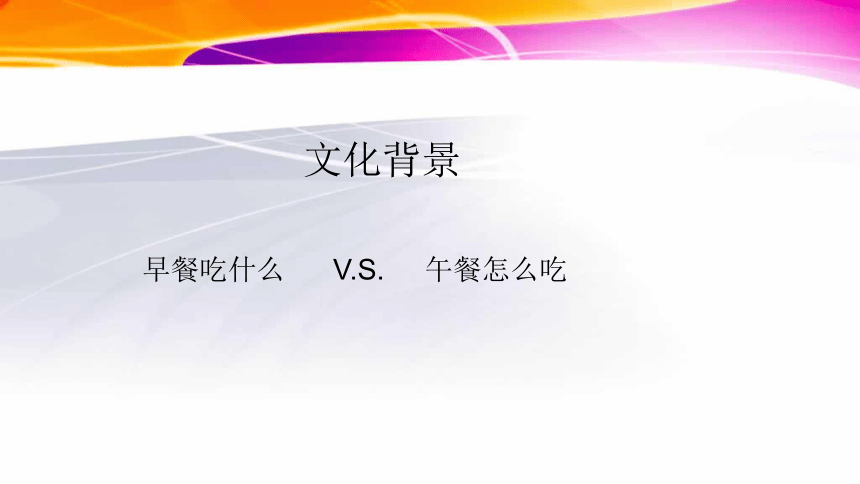

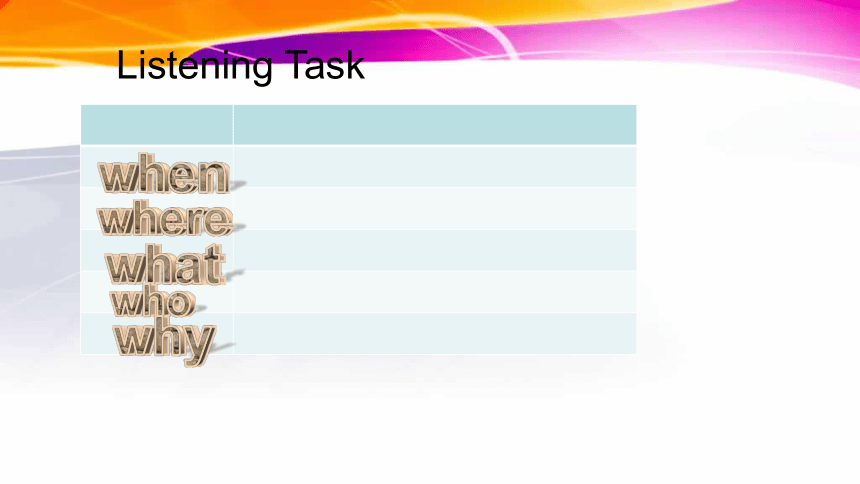

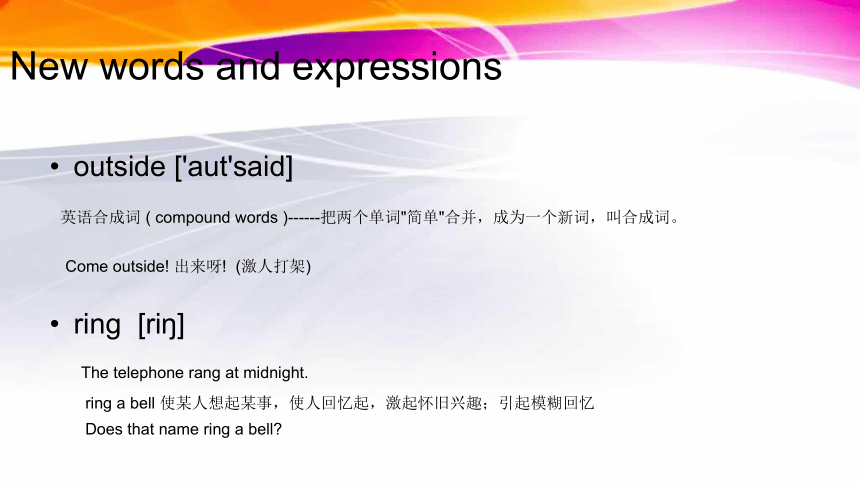
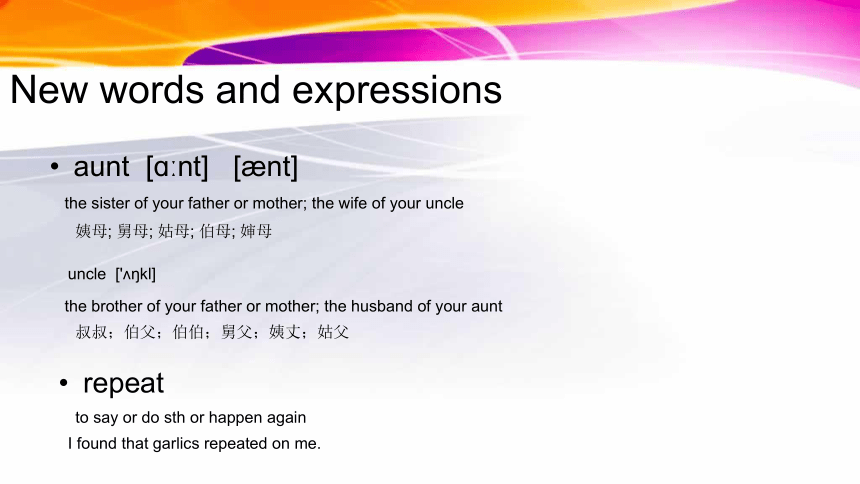
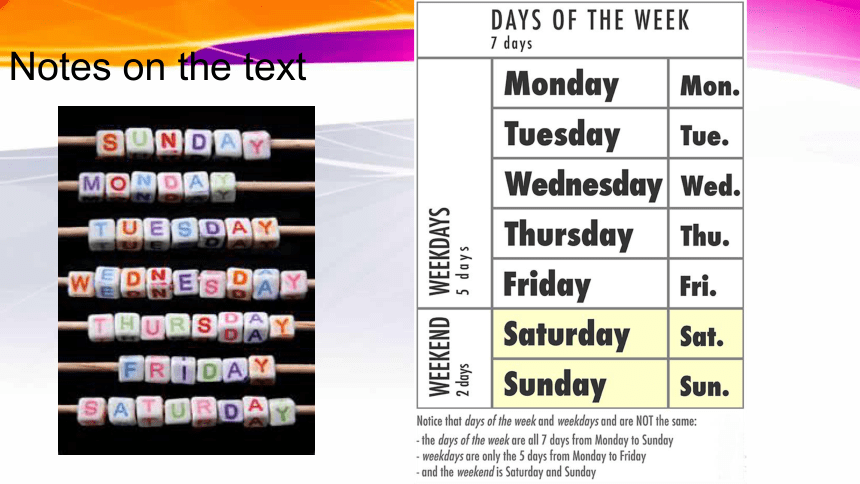
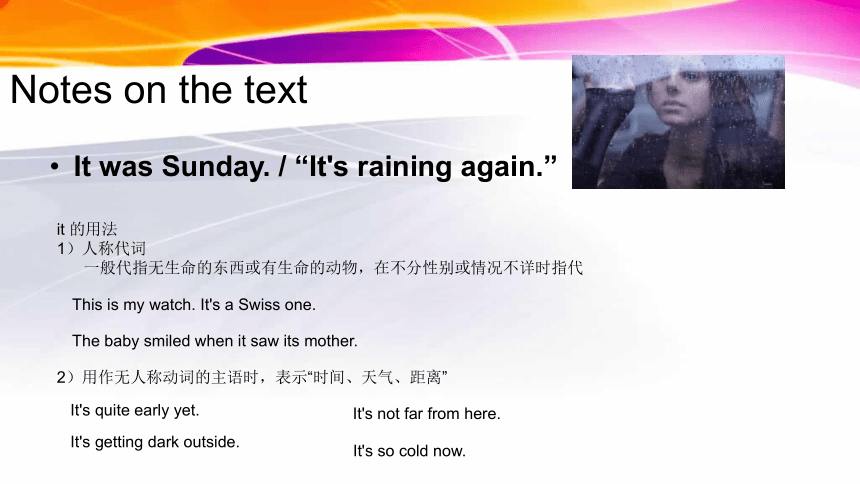
文档简介
(共20张PPT)
Lesson 2 Breakfast or Lunch
文化背景
早餐吃什么 V.S. 午餐怎么吃
歪果仁
早餐吃什么
Listening Task
where
when
what
who
why
New words and expressions
until [ n'til]
If something happens until a particular time, it happens during the period before that time and stops at that time.
直到...才;直到...为止
There's no subway in Qingdao until last year.
那个男的和那个女的一直在大声说话,直到我回过头来愤怒地看了他们一眼,才停下。
常用结构: not ... until ...
The play didn't start until 8:00.
Our class didn't dismiss until 8:30.
New words and expressions
outside ['aut'said]
英语合成词 ( compound words )------把两个单词"简单"合并,成为一个新词,叫合成词。
Come outside! 出来呀! (激人打架)
ring [ri ]
The telephone rang at midnight.
ring a bell 使某人想起某事,使人回忆起,激起怀旧兴趣;引起模糊回忆
Does that name ring a bell
New words and expressions
aunt [ɑ nt] [ nt]
the sister of your father or mother; the wife of your uncle
姨母; 舅母; 姑母; 伯母; 婶母
uncle [' kl]
the brother of your father or mother; the husband of your aunt
叔叔;伯父;伯伯;舅父;姨丈;姑父
repeat
to say or do sth or happen again
I found that garlics repeated on me.
Notes on the text
Notes on the text
It was Sunday. / “It's raining again.”
it 的用法
1)人称代词
一般代指无生命的东西或有生命的动物,在不分性别或情况不详时指代
This is my watch. It's a Swiss one.
The baby smiled when it saw its mother.
2)用作无人称动词的主语时,表示“时间、天气、距离”
It's quite early yet.
It's getting dark outside.
It's not far from here.
It's so cold now.
Notes on the text
I sometimes stay in bed until lunchtime.
stay:continuing or remaining in a place or state
Could you stay for a while
You could stay in Hilton Hotel.
stay in bed 卧病在床,卧床;呆在床上;在床休息
大夫让她卧床。
“恐怕你得卧床一周。”
stay in bed late
stay up
表示频率的英语表达
1. a few times 几次
2. all the time 总是
3. almost always 几乎总是
4. almost never 几乎不
5. at times 有时,偶尔
6. constantly 经常
7. every hour 每小时
8. frequently 经常
9. hardly ever 几乎不
10. nearly always 几乎总是
11. once a day 每天一次
12. three times a week 每周三次
13. twice a month 每个月两次
Notes on the text
Last Sunday I got up very late.
I never get up early on Sundays.
一般来说,时间短语与介词搭配,但下面几种情况除外:
1)在 next / last / this 组成的时间短语前不加介词。e.g.
He is going to the theatre next month.
I stayed up last Monday, because I drank too much coffee.
I had a very good breakfast this morning.
Notes on the text
2)在 tomorrow / yesterday / the day after tomorrow / today / the day before yesterday 前不加介词
I will have a day off the day after tomorrow.
3)在 one / any / each / every / some / all 跟时间名词构成的时间短语时,前面也不加介词
She stayed in bed all day.
You can come any day.
I get up early every day after having a baby.
Notes on the text
dark: absence of light or illumination
It was dark outside.
in the dark 在黑暗中
We lost the way in the dark.
感叹句指的就是用以表示喜怒哀乐等强烈感情的句子。如:
Wonderful ! 真棒!
Good heavens !天哪!
How cold it is !天气多冷呀!
What a lazy man ! 这个人真懒!
英语的感叹句通常以how和what开头,
其中
what修饰名词,
how 修饰形容词、副词或动词。
It was dark outside.
Notes on the text
'I've just arrived by train,' she said.
1)arrive at 到达(目的地),抵达(某地):
We arrived at the airport one hour early.
他们早晨抵达伦敦
我们将在一个小时之后抵达香港。
[表示方法、方式、手段或媒介,表示行为者是谁或起作用的事物是什么]靠,用,通过,被,由:
2)by train
made by hand
He arrived by air.
She came by the highway.
Grammar
Thank you!
Lesson 2 Breakfast or Lunch
文化背景
早餐吃什么 V.S. 午餐怎么吃
歪果仁
早餐吃什么
Listening Task
where
when
what
who
why
New words and expressions
until [ n'til]
If something happens until a particular time, it happens during the period before that time and stops at that time.
直到...才;直到...为止
There's no subway in Qingdao until last year.
那个男的和那个女的一直在大声说话,直到我回过头来愤怒地看了他们一眼,才停下。
常用结构: not ... until ...
The play didn't start until 8:00.
Our class didn't dismiss until 8:30.
New words and expressions
outside ['aut'said]
英语合成词 ( compound words )------把两个单词"简单"合并,成为一个新词,叫合成词。
Come outside! 出来呀! (激人打架)
ring [ri ]
The telephone rang at midnight.
ring a bell 使某人想起某事,使人回忆起,激起怀旧兴趣;引起模糊回忆
Does that name ring a bell
New words and expressions
aunt [ɑ nt] [ nt]
the sister of your father or mother; the wife of your uncle
姨母; 舅母; 姑母; 伯母; 婶母
uncle [' kl]
the brother of your father or mother; the husband of your aunt
叔叔;伯父;伯伯;舅父;姨丈;姑父
repeat
to say or do sth or happen again
I found that garlics repeated on me.
Notes on the text
Notes on the text
It was Sunday. / “It's raining again.”
it 的用法
1)人称代词
一般代指无生命的东西或有生命的动物,在不分性别或情况不详时指代
This is my watch. It's a Swiss one.
The baby smiled when it saw its mother.
2)用作无人称动词的主语时,表示“时间、天气、距离”
It's quite early yet.
It's getting dark outside.
It's not far from here.
It's so cold now.
Notes on the text
I sometimes stay in bed until lunchtime.
stay:continuing or remaining in a place or state
Could you stay for a while
You could stay in Hilton Hotel.
stay in bed 卧病在床,卧床;呆在床上;在床休息
大夫让她卧床。
“恐怕你得卧床一周。”
stay in bed late
stay up
表示频率的英语表达
1. a few times 几次
2. all the time 总是
3. almost always 几乎总是
4. almost never 几乎不
5. at times 有时,偶尔
6. constantly 经常
7. every hour 每小时
8. frequently 经常
9. hardly ever 几乎不
10. nearly always 几乎总是
11. once a day 每天一次
12. three times a week 每周三次
13. twice a month 每个月两次
Notes on the text
Last Sunday I got up very late.
I never get up early on Sundays.
一般来说,时间短语与介词搭配,但下面几种情况除外:
1)在 next / last / this 组成的时间短语前不加介词。e.g.
He is going to the theatre next month.
I stayed up last Monday, because I drank too much coffee.
I had a very good breakfast this morning.
Notes on the text
2)在 tomorrow / yesterday / the day after tomorrow / today / the day before yesterday 前不加介词
I will have a day off the day after tomorrow.
3)在 one / any / each / every / some / all 跟时间名词构成的时间短语时,前面也不加介词
She stayed in bed all day.
You can come any day.
I get up early every day after having a baby.
Notes on the text
dark: absence of light or illumination
It was dark outside.
in the dark 在黑暗中
We lost the way in the dark.
感叹句指的就是用以表示喜怒哀乐等强烈感情的句子。如:
Wonderful ! 真棒!
Good heavens !天哪!
How cold it is !天气多冷呀!
What a lazy man ! 这个人真懒!
英语的感叹句通常以how和what开头,
其中
what修饰名词,
how 修饰形容词、副词或动词。
It was dark outside.
Notes on the text
'I've just arrived by train,' she said.
1)arrive at 到达(目的地),抵达(某地):
We arrived at the airport one hour early.
他们早晨抵达伦敦
我们将在一个小时之后抵达香港。
[表示方法、方式、手段或媒介,表示行为者是谁或起作用的事物是什么]靠,用,通过,被,由:
2)by train
made by hand
He arrived by air.
She came by the highway.
Grammar
Thank you!
同课章节目录
